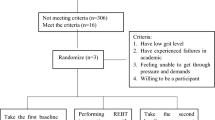Abstract
This article describes how rational emotive behavior therapy and other cognitive-behavioral therapies can be used to improve the achievement of academically at-risk African American students at the middle-school level. Definitions of at-risk and a review of relevant literature are provided. This article offers an outline of several main irrational beliefs that can lead to academic failure for African American students at the middle-school level. This author suggested that escalating preferences for justice, acceptance within the African American community, and acceptance by European Americans are at the core for causing academic failure for many of these students. The author describes empirical data which show that once these students learn a realistic philosophy of life—to be more rational, tolerant, nonutopian, and nondemanding—the students improve in their academic self-concept and achievement.
Similar content being viewed by others
References
Banks, J. (1984). Black youths in predominantly White suburbs: An exploratory study.Journal of Negro Education, 53, 13–17.
Brookover, W., Beady, C., Flood, P., Schweitzer, J., & Wisenbaker, J. (1979).School social systems and student achievement. New York: Praeger.
Brookover, W., Paterson, A., & Schailer, T. (1962). Self-concept of ability and school achievement (Cooperative Research Project 485). East Lansing, MI: Michigan State University College of Education.
Ellis, A. (1985).Overcoming resistance: Rational-emotive therapy with difficult clients. New York: Springer.
Ellis, A. (1995). Rational emotive behavior therapy. In R. J. Corsini & D. Wedding (Eds.),Current psychotherapies (5th ed., pp. 161–196). Itasca, IL: F. E. Peacock.
Farrell, W., Sapp, M., Johnson, J., & Pollard, D. (1994). Assessing college aspirations among at-risk high school students: A principal component analysis.The High School Journal, 77(4), 294–303.
Gibson, R. L., Mitchell, M. H., & Basile, S. K. (1993).Counseling in the elementary school: A comprehensive approach. Needham Heights, MA: Allyn and Bacon.
Livneh, H., & Wright, P. E. (1995). Rational emotive therapy. In D. Capuzzi & D. R. Gross (Eds.),Counseling and psychotherapy: Theories and interventions (pp. 325–352). Englewood Cliffs, NJ: Merrill.
Mylott, K. (1994). Twelve irrational ideas that drive gay men and women crazy.Journal of Rational-Emotive and Cognitive-Behavior Therapy, 12(1), 61–72.
Peterson, C., & Austin, J. T. (1985). Review of Coopersmith self-esteem inventories. In theNinth mental measurements yearbook (pp. 396–397). Lincoln, NE: Buros.
Sapp, M. (1990a). Psychoeducational correlates of junior high school at-risk students.The High School Journal, 73(4), 232–234.
Sapp, M. (1990b). Psychoeducational predictors of achievement for at-risk Milwaukee Public School junior high school students.The Wisconsin Counselor, 125(2), 10–15.
Sapp, M. (1991).A pilot study exploring the race of therapist and the ability to use cognitive-behavioral therapy with at-risk African American students. Unpublished manuscript, University of Wisconsin-Milwaukee, Milwaukee, Wisconsin.
Sapp, M. (1993).Test anxiety: Applied research, assessment, and treatment interventions, Lanham, MD: University Press of America.
Sapp, M. (1994). Cognitive-behavioral counseling: Applications for African American middle school students who are academically at-risk.Journal of Instructional Psychology, 21(2), 161–171.
Sapp, M., & Farrell, W. (1994). Cognitive-behavioral interventions: Applications for academically at-risk and special education students.Preventing School Failure, 38(2), 19–24.
Sapp, M., Farrell, W., & Durand, H. (1995). Cognitive-behavioral therapy: Applications for African American middle school at-risk students.Journal of Instructional Psychology, 22(2), 169–177.
Slavin, R. E., Karweit, N. L., & Madden, N. A. (1989).Effective programs for students at-risk. Needham Heights, MA: Allyn and Bacon.
Vernon, A. (1989).Thinking, feeling behaving: An emotional education curriculum for children grades 1–6. Champaign, IL: Research Press.
Weinrach, S. G. (1995). Rational emotive behavior therapy: A tough-minded therapy for a tender-minded profession.Journal of counseling and Development, 73(3), 296–300.
Author information
Authors and Affiliations
Rights and permissions
About this article
Cite this article
Sapp, M. Irrational beliefs that can lead to academic failure for African American middle school students who are academically at-risk. J Rational-Emot Cognitive-Behav Ther 14, 123–134 (1996). https://doi.org/10.1007/BF02238186
Issue Date:
DOI: https://doi.org/10.1007/BF02238186



